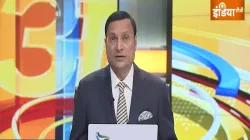OPINION | How Opposition fumbled on Modi's meditation in Kanyakumari
Prime Minister Narendra Modi headed to Kanyakumari, where he began his meditation for 45 hours at Vivekananda Rock Memorial. The meditation spell will end on June 1 afternoon.

As curtains fell on the two-month-long campaigning for Lok Sabha elections, Prime Minister Narendra Modi headed to Kanyakumari, where he began his meditation for 45 hours at Vivekananda Rock Memorial. The meditation spell will end on June 1 afternoon. Exit polls will be telecast on June 1 after the last phase of polling is over. Counting will take place on June 4 and the nation will come to know who will lead the next government. Before leaving for Kanyakumari, Modi said, the people of India have made up their mind and his government is going to get a third term. He said, a time-bound plan for the next five years of his government has already been prepared, but firstly, a 125-day action plan will be put in motion. Opposition leaders have described Modi’s meditation spell in Kanyakumari as a “gimmick”, which was meant to influence voters who will be casting their vote on June 1. Congress leaders alleged that this meditation spell, in the glare of cameras, was a clear violation of Model Code of Conduct. A delegation of Congress leaders went to the Election Commission to lodge a complaint.
Congress President Mallikarjun Kharge said, meditation at Vivekananda Rock was not necessary to understand the philosophy of Mahatma Gandhi and to realize the pain and sufferings of common people. “One needs to introspect and read a lot”, he advised. Congress leader Jairam Ramesh, in a jibe, said, Modi will have ample time to meditate after June 4, since he would no longer remain the Prime Minister. Samajwadi Party chief Akhilesh Yadav said, Modi left for Kanyakumari to meditate after making people vote during a heat wave, and the people will surely teach him a lesson. RJD leader Tejashwi Yadav said, this was a “marketing gimmick”. He asked, where was the need for taking so many cameras to show that he was meditating. Trinamool Congress chief Mamata Banerjee said, “the nation has never seen such a Prime Minister who indulged in gimmicks, the office of Prime Minister carries dignity, otherwise who takes cameras for meditation?” A swift response came from leaders, who, till recently, were Congress leaders.
Sanjay Nirupam, expelled from Congress on April 3 for ‘indiscipline’, said, meditation is required for inner peace. “It is a spiritual tool for self-purification, it is part of Indian culture, and those who seek intoxication to drown their exhaustion, will not understand the true meaning of meditation. Acharya Pramod Krishnam, who was expelled from Congress on February 11 for visiting Ram Temple in Ayodhya, said, “Modi is meditating to gain energy to fight the forces of evil. Those having faith in Vatican City heritage instead of Hindu spiritualism, will never understand its significance.” On Thursday, in Kanyakumari, Modi first offered prayers in Bhagavathi Amman temple, and later went to Dhyan Mandapam at Vivekananda Rock Memorial to begin his meditation. It was at this confluence of Bay of Bengal, Arabian Sea and Indian Ocean that Swami Vivekananda sat on a rock to meditate for three days in December, 1892, before going to deliver his historic speech at the World Parliament of Religions in Chicago, US, in 1893. It was at this sacred rock that Swami Vivekananda realised the true, spiritual nature of Mother India, when he spoke of his dream for a resurgent, prosperous Bharat. In 1963, Eknath Ranade, former general secretary of RSS, set up the Vivekananda Kendra for building this memorial, with the help of donations from citizens and state governments. The then President V V Giri inaugurated the Vivekananda Rock Memorial in 1970.
Since Prime Minister Modi has set Viksit Bharat (Developed India) as his goal during his third term, it was in the nature of things that Modi went to Kanyakumari to spend his time in meditation, away from the heat and dust of electoral politics. I was surprised when experienced political leaders like Mallikarjun Kharge and Mamata Banerjee made Modi’s meditation on Vivekananda Rock an issue. Both of them know, this is, in no way, a violation of Model Code of Conduct, nor is Modi going to gain electoral advantage by meditation of Vivekananda Rock. But, by lodging complaint and raising questions about the meditation, the opposition parties have attracted public attention towards this issue. Congress and other opposition leaders committed the same mistake when they boycotted the consecration of Ram Temple in Ayodhya. Some leaders said, they were not invited, but Vishwa Hindu Parishad claimed that all opposition leaders were invited. Some leaders said the temple was partially built and no consecration can take place as per Hindu rites. The Shankaracharya replied to this. One leader questioned the need of such a temple, and Modi replied to this in his public rallies.
Throughout the two-month-long campaign, the opposition gave plenty of opportunities to Modi. Rahul Gandhi’s political adviser Sam Pitroda floated the idea of US-type inheritance tax. Mani Shankar Aiyar bowled ‘no balls’ twice. First he said, India should respect Pakistan, because it has atomic bombs. Secondly, he described the 1962 Chinese invasion with the adjective “alleged”. Modi pulled both no balls to the boundaries. Now, question has been raised about Modi sitting on meditation in Kanyakumari. Naturally, the backlash is going to be a big one. It would have been better if the Opposition remained mum. Modi’s meditation would not have become an issue.
Aaj Ki Baat: Monday to Friday, 9:00 pm
India's Number One and most followed Super Prime Time News Show 'Aaj Ki Baat- Rajat Sharma Ke Saath' was launched just before the 2014 General Elections. Since its inception, the show has redefined India's super-prime time and is numerically far ahead of its contemporaries.